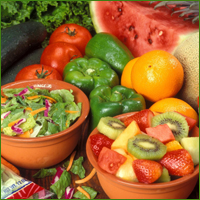
By Jeff Novick, M.S., R.D. (July 17, 2009)
The American Dietitic Association just released their 2009 update of their Position Paper on Vegetarian Diets.
Position of the American Dietetic Association: vegetarian diets.
Craig WJ, Mangels AR; American Dietetic Association.
J Am Diet Assoc. 2009 Jul;109(7):1266-82.
PMID: 19562864
Their positition is…
“It is the position of the American Dietetic Association that appropriately planned vegetarian diets, including total vegetarian or vegan diets, are healthful, nutritionally adequate, and may provide health benefits in the prevention and treatment of certain diseases. Well-planned vegetarian diets are appropriate for individuals during all stages of the lifecycle, including pregnancy, lactation, infancy, childhood, and adolescence, and for athletes. “
This paper, published in the July issue of the Journal of the American Dietitic Association, is a comprehensive overview of the current science surrounding vegetarian diets and covers many areas and aspects of the vegetarin diet including consumer trends, new product availability, health implications and nutritional considerations. The conclusion states…
“Appropriately planned vegetarian diets have been shown to be healthful, nutritionally adequate, and may be beneficial in the prevention and treatment of certain diseases. Vegetarian diets are appropriate for all stages of the life cycle. There are many reasons for the rising interest in vegetarian diets. The number of vegetarians in the United States is expected to increase during the next decade. Food and nutrition professionals can assist vegetarian clients by providing current, accurate information about vegetarian nutrition, foods, and resources.”
The important issues here is “appropriately” as not any vegetarian or vegan diet will be healthy. In the current world, the food industry, including the health food industry has created a tremendous amount of processed and/or packaged vegetarian and vegan food that is really nothing more than junk food that is being advertised and promoted misleadingly as being healthy. Today, one could easily follow a vegan/vegetarian diet that is composed mostly of these highly refined and/or highly processed foods and be consuming a very unhealthy diet.
The terms vegetarian and/or vegan only tell you what someone doesn’t eat, not one someone does eat. Vegetarianism and veganism are philosophies that include dietary restrictions and are not automatically guides to dietary excellence and optimal health. And, while what we avoid consuming in our diet is important, sometimes the foods we choose to include are more important than what we eliminate.
Everyone, regardless of whether they choose to define themselves as a vegan or vegetarian needs to center their diet around unrefined unprocessed fresh fruits, vegetables, starchy vegetables, intact whole grains and legumes. This is the basis of a truly healthy diet and should compromise the majority of ones intake, regardless of whether or not it completely eliminates animal products or not.
In Health
Jeff


 SUBSCRIBE TODAY AND NEVER MISS AN UPDATE
SUBSCRIBE TODAY AND NEVER MISS AN UPDATE